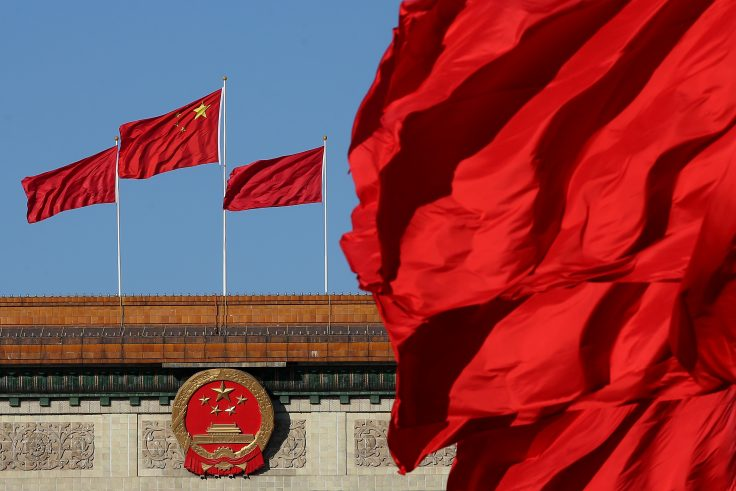
New document lays out longterm strategy for beating Chinese Communist Party
The United States’ ability to counter the rise of China is being undermined by anti-American attitudes in the education system, according to a new State Department report outlining a longterm strategy to compete with China.
The agency said Americans need to be educated about the strategic threat that Beijing poses to U.S. interests and called for government officials and the public to have access to English translations of Chinese Communist Party speeches. Such an effort, according to the State Department, could be undermined by high school and college systems that are hostile to America’s founding principles and history.
“America’s grade schools, middle schools, high schools, and colleges and universities have to a dismaying degree abandoned well-rounded presentations of America’s founding ideas and constitutional traditions in favor of propaganda aimed at vilifying the nation,” the paper reads. “In the face of these polarizing forces, the United States must reclaim its own legacy of liberty.”
Rachelle Peterson, a senior fellow at the National Association of Scholars, called the State Department’s assessment of American education “spot on.” Young people raised with a “biased, disfigured teaching of our own history” will be “receptive to Chinese propaganda,” according to Peterson.
“For years, students have been taught American history as an unbroken chain of violated promises, ignoring the groundbreaking work Americans have done to advance the cause of personal liberty and individual responsibility,” Peterson said. “Is it any wonder that students, convinced America is inherently bigoted, find Chinese propaganda persuasive?”
The department said Beijing will present an intractable problem for years to come and will not simply be an issue for the current administration.
“The China challenge, so understood, is likely to dominate American foreign policy across many administrations,” the paper reads. “The major components of China’s conduct … reveal a great power that sees the transformation of international order as critical to its plans to dominate world affairs.”
The paper called on lawmakers to increase investment in state-of-the-art technologies and bolster diplomatic institutions such as the International Development Finance Corporation and the Blue Dot Network to counter Chinese influence abroad. It also asserts that the CCP regime has deep external and internal vulnerabilities that the United States must seize on, such as its declining population and slowing economic growth.
Experts and lawmakers championed the document as a crucial contribution to America’s strategy to confront the communist regime. Dan Blumenthal, an American Enterprise Institute scholar and author of The China Nightmare, said China is best approached as “a Leninist empire” that seeks to dominate not only its domestic population, but populations abroad as well.
“The fact that it is an empire guides much of its action against Xinjiang, Tibet, Hong Kong, and Taiwan,” Blumenthal said. “The report is wise to point out China’s vulnerabilities. A competitive strategy would press on those vulnerabilities.”
Rep. Mike Gallagher (R., Wis.) has been a leading voice on Capitol Hill against Chinese power plays, sponsoring legislation that would put Beijing on the defensive on issues ranging from cybersecurity to the Australian alliance. He praised the State Department for acknowledging the rising threat of the CCP and said it established a solid framework for future administrations.
“The State Department’s new paper on the China challenge sets an important strategic framework for our competition with the Chinese Communist Party,” Gallagher told the Washington Free Beacon. “It laser-focuses on the under-appreciated ideological origins of the CCP’s reckless aggression and sets a compelling North Star for U.S. strategy: securing freedom at home and abroad. This is a strategy that deserves bipartisan support and should serve as a foundation for U.S.-China policy for years to come.”
Experts also spoke to the strength of the State Department’s efforts. Foundation for Defense of Democracies defense experts Bradley Bowman and Nathan Picarsic applauded the document for laying out the stakes of the conflict.
“The Policy Planning Staff at the Department of State deserves credit for undertaking such an ambitious paper focused on the People’s Republic of China—the greatest threat that the United States and fellow democracies confront,” Bowman told the Free Beacon. “As the paper notes, the staff is trying to ‘step back and take a long-term view.’ Too few in the U.S. government attempt to do that, and such an effort is sorely needed.”
Picarsic called Beijing’s rise “a generational challenge.” He emphasized that America’s cooperation with European and Asian partners across several areas will determine how Washington stands up to China.
“The hard work ahead will be determined by those on the ground and in the trenches of 21st-century battlegrounds spanning ideological, technological, economic, and military domains,” Picarsic said.
 Eurasia Press & News
Eurasia Press & News



